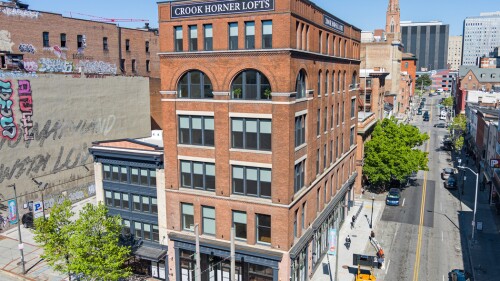As a longtime editor and columnist for Fortune magazine, Geoff Colvin has become one of America’s sharpest and most respected commentators on leadership, globalization, wealth creation, the infotech revolution, and related issues.
He spoke with Urban Land in anticipation of his keynote in May at the 2013 ULI Spring Meeting in San Diego on the current state of the economy and what it means for real estate.

You wrote recently about the rapid obsolescence of certain business models. How do you see these paradigm shifts impacting businesses such as commercial real estate?
It’s a big story in commercial real estate, as the buildings tend to last a long time. But the buildings may last longer than the business model. In an awful lot of businesses, the model lasted for decades, if not a century. It just doesn’t anymore. The ability to envision different business models for a given property is going to be extremely valuable.
This is something I’m hearing about from people increasingly: getting comfortable with a new business model—changing it every year, potentially.
The problem in doing that is primarily a cultural problem—people just having personal difficulty changing their view of what they do, what the company does. Anytime you change things, you threaten existing interests. Conceptually, making these changes is easy. Even technologically, it’s easy. It’s the human element that makes it difficult.
Where do you see the big opportunities for business now, given the uncertainty in the Eurozone and sequestration?
If all we talk about is what’s in the headlines, we’ll get so depressed we can hardly stand it. The global economy is growing quite nicely, even if things aren’t growing as fast in China or India.
Turkey, Indonesia, Nigeria, Kenya—these are fast-growing countries. And even in parts of the U.S., there’s still significant growth.
I talk to a lot of entrepreneurs, and the advantages Americans have are still significant. We have the most flexible workforce and the most developed capital markets. We have a culture that embraces risk taking, moves on from failure, and not all cultures are like that.
Do you see the U.S. economic recovery as accelerating or stagnating, or is that not even relevant at this point?

We still have a fairly significant debt burden—not just at the federal level, but at the state, municipal, and even at the individual level—and deleveraging isn’t pleasant.
What can others learn from the kind of companies thatFortune focuses on?
We just published our list of the Most Admired Companies. It’s not the ones Fortune admires most; it’s a survey. But seven of the top ten are a sort of a one-man phenomenon—two in the case of Google—where they [the founders] are still around. That’s very different from 30 years ago, where you had these institutions.
Will these be the most-admired companies ten or 20 years from now? To me, it’s not at all clear that they will be. Showing you can last a long time is not a given. What seems to determine whether they last is strength of brand and culture.
How has the impact of events like Superstorm Sandy affected your view?
Our whole view of building right on the coast has to be reassessed—our view of buildings, how we insure those buildings. It’s probably time for a big-picture, long-term reassessment of how we do all that. That may be obvious, but it’s also hard. We’re going to have to force ourselves to face it.
Even the role of the federal government may have to be reconsidered. The taxpayers in Kansas may start to wonder why they are underwriting beachfront properties.
To what extent is health care going to drive a lot of the decision making over the next decade?
There are a few things we know. Total health care spending—spending by the government and private sector—we know cannot keeping increasing. As the economist Herb Stein said, “If something cannot go on forever, it will stop.” The rate of increase has to slow down. But we also know the baby boomers are reaching the stage of life where they are going to need a great deal of health care. The technological breakthroughs are going to keep happening and be amazing. The health care industry is going to get even larger, at least for a while. It’s going to be a huge business, and for commercial real estate, some of the implications are obvious.
Many people are surprised to find we have too many hospital beds. More and more, we can do things outside of the hospital. And [patients] stay a shorter time. The very sick will still need them, but a lot of the medical care is going to be outside of the hospitals more and more.
To what extent do you see things like outsourcing and teleworking changing how business is done?
The technological and mechanical skills are going to be commoditized. More and more people are going to be trained in them; they are going to be less and less of a competitive advantage. The advantage will come from people’s human abilities—to interact with one another, to have intuition to make quick decisions, to have empathy to understand others. A lot of these things do work better when you are in physical proximity of each other.
In your book Talent Is Overrated, you cite Jeffrey Immelt and Steve Ballmer as two of the “least likely to succeed” young employees at Proctor & Gamble. What advice would you give to people who have faced setbacks or uncertainty in their own careers over the last few years?
Some of these stories are very inspirational. David Ogilvy, the man who became one of the great advertising executives of the 20th century, got to be into his late 30s without showing any inclination at all that he would be successful. Even if we could imagine him in the advertising industry, there was nothing to indicate he’d be great at creating things, like the famous “man with an eye patch” campaign for C.F. Hathaway.
Innate talent isn’t what makes people great performers. We can all make ourselves great.
Geoff Colvin will be speaking on the current state of the economy and what it means for real estate at the ULI Spring Meeting from May 15-17. Go to ULISpring.org for more information.





